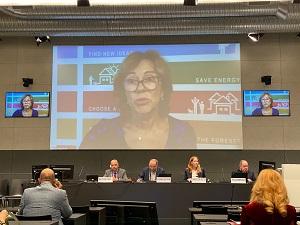
The UNECE region is not on track to meet the Sustainable Development Goals (SDGs) by 2030. Public procurement can be a powerful policy lever to accelerate progress. Some Governments in the UNECE region spend as much as 20 percent of GDP annually on procuring goods, services, and infrastructure.
But are these goods and services produced in a sustainable way? Is the infrastructure built and operated sustainably? Are Governments using their procurement spending to make their own operations more sustainable? And are they using it to set an example and to catalyse the development, deployment and use of innovative, more sustainable goods, services, production processes and consumption patterns in the economy at large?
All too often the answer is no, as public procurement agencies pick the bidders who can supply conventional goods, services, and infrastructure at the lowest price – or the lowest capital expenditure – without regard to long-term sustainability.
At the 15th session of the UNECE Committee on Innovation, Competitiveness and Public-Private Partnerships on 25-27 May 2022, Governments that are committed to accelerating sustainable development showcased how they are changing their approach to public procurement to open up new opportunities for investing – and mobilizing private investment – into sustainable, green infrastructure and into innovation for sustainable development.
To do so, leading public procurement agencies are publishing tenders specifying the sustainability criteria which bids have to meet – rather than the technical specifications of products to be bought – and are awarding bids on the basis of total life-cycle costs – rather than on the basis of lowest initial cost.
In this way, procurement agencies demonstrate that there will be a market for innovative solutions to sustainable development challenges. This creates powerful incentives for private companies to invest into R&D to create these innovative solutions.
Governments have a particularly critical role to play in setting such incentives where systemic change is required, such as in the transition to a circular economy.
When it comes to infrastructure, public-private partnerships (PPPs) can be a natural way to procure green and sustainable solutions. PPPs intrinsically employ a life-cycle cost approach, and the typically massive scale of PPP projects creates leverage to make both government and business practices more sustainable. Public-private partnerships can also be a good way for Governments to optimally spread the typically higher capital expenditures of more sustainable infrastructure over time.
The policy dialogue at the Committee also showed that it is not enough to change procurement rules. Governments need to demonstrate high-level political commitment. Both public procurement agencies and private sector bidders need to strengthen their capacity and skills to handle more complex sustainable procurement and PPP projects. A particular challenge in this regard is making sure that tendering processes are not too expensive and cumbersome for small, innovative enterprises, including start-ups, to participate. Procurement agencies and their clients also need to get better at managing long-term sustainability risks, including by starting with small pilot projects and scaling up successful ones. The Committee also discussed how lessons learned and approaches that have been proven to work in advanced economies can be transferred to less advanced settings.
UNECE is supporting its member States' use of PPPs to accelerate achievement of the SDGs in the region by developing practical guidelines on implementation, methodologies, and pilots to put theory into practice and better include sustainability elements in infrastructure projects. UNECE will also support member States on innovation-enhancing procurement, including through a capacity building project with the National Procurement Agency and the Innovation and Technology Agency of Georgia in follow-up to policy recommendations in the recent UNECE Innovation for Sustainable Development Review of Georgia.

